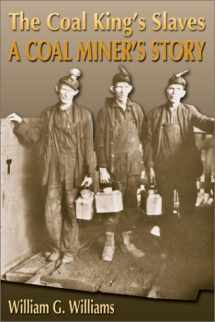
The Coal King's Slaves
ISBN-13:
9781572493193
ISBN-10:
1572493194
Author:
William G. Williams
Publication date:
2002
Publisher:
Burd Street Pr
Format:
Paperback
208 pages
FREE US shipping
Book details
ISBN-13:
9781572493193
ISBN-10:
1572493194
Author:
William G. Williams
Publication date:
2002
Publisher:
Burd Street Pr
Format:
Paperback
208 pages
Summary
The Coal King's Slaves (ISBN-13: 9781572493193 and ISBN-10: 1572493194), written by authors
William G. Williams, was published by Burd Street Pr in 2002.
With an overall rating of 4.4 stars, it's a notable title among other
books. You can easily purchase or rent The Coal King's Slaves (Paperback) from BooksRun,
along with many other new and used
books
and textbooks.
And, if you're looking to sell your copy, our current buyback offer is $0.3.
Description
The mining of coal created jobs, built towns, and powered the ships, trains, and factories, which leapfrogged the United States into one of the world's most powerful nations. But it also snuffed out the lives of too many men and boys and left too many widows struggling to keep the rest of their families intact. In The Coal King's Slaves, a father and his three sons face blackness, filth, hardships, and extreme danger in the anthracite coal mines of eastern Pennsylvania while the woman of their home struggles to keep her family alive. The Coal King's Slaves, a historical novel set in the late 1800s, looks back on family life, living conditions, social barriers, industrial greed, violent confrontations, and death and destruction in the coal pits. Some saw "King Coal" as the answer to a fairly steady income. Some felt it was the mysterious force that attracted men to a dangerous occupation and a proud brotherhood of workers. And some assigned the title, with disgust, to mine owners and managers who had more concern for the well-being of mine mules than they did for human workers. The 19th century was a particularly cruel time for mining families, and the treatment they received from many owners and managers led to deadly confrontations and finally to the formation of miners' unions. Not all bosses were cruel people, but many did lack compassion for the needs of employees, their families, their health problems, their living conditions, and their lives in general. For too many miners it was a form of slavery from which escape was difficult.


We would LOVE it if you could help us and other readers by reviewing the book
Book review

Congratulations! We have received your book review.
{user}
{createdAt}
by {truncated_author}


